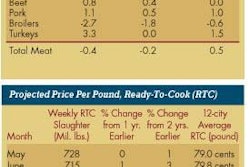
Can agriculture develop sustainable energy resources, protect the environment and feed a growing global population? These questions were asked of a distinguished panel at Alltech's 24th International Animal Health and Nutrition Symposium held in Lexington, Ky.
According to Osler Desouzart, these choices shouldn't be either or propositions. It shouldn't be a question of starvation versus environmental deprivation at all, because one isn't more important than the other, pointed out Desouzart, president of OD Consulting and formerly with Sadia, Perdigao and Doux Frangosul in Brazil.
Desouzart was one of three noted agricultural policy makers to debate feed, food and fuel issues. He was joined by Mike Johanns, former secretary of the USDA, and David Byrne, former European Union Commissioner for Health and Consumer Protection. When asked about the competing forces on feed and food and the need for sustainability, Desouzart said the answer is easy. If technologies are allowed to be applied to the matters of both fuel and food, then the growing global population can be satisfied and more environmentally friendly practices will rise to the top.
Desouzart said agriculture will produce enough cereals, roots, sugar, vegetable oils, meat, and other foods to meet the growing demand. Looking for the right figures on how much meat will need to be produced is not the issue. "The issue is that there is going to be production and there is going to be consumption," he said. Desouzart challenged agriculture to think beyond traditional practices. "We have to do it, we will do it. We can do it without destroying the planet." The key is allowing agriculture to do its job and for sciencenot sensationalism and faulty logicto prevail.
All three industry leaders taking part in the food and fuel debate underscored the need for further investment in science and for the application of emerging research and technologies.
Consumer confidence
In addition to debating agriculture's role in feeding the world and safeguarding the environment, these leaders were asked to discuss how agriculture can gain consumer confidence in a safe food supply, yet another stepping stone to become a truly green industry.
Byrne said that preserving consumer confidence is paramount to a successful food production system, and pointed to his days addressing the BSE issue in Europe. "I learned a lesson at that time that to regain and retain consumer confidence, you have to be in position to show the public that there is somebody or some entity in charge of this, that a plan has been developed, and that the public knows what that plan is and that those in charge can identify for the public that that plan is working. If you have these factors in place, you can then go to the public and say that the problem has been solved, the issues have been reformed, and the demon is gone. I believe that is critically important."
Ethanol versus feed
When asked about the impact ethanol production is having on the costs of commodities and available environmental resources, Secretary Johanns fell back on his long-standing position as a proponent of renewable energy produced in the North American corn belt, summing up his thoughts by stating, "Biofuels can be part of what I call an American Rural Renaissance."
Cellulosic ethanol
Some in the feed industry are trying to develop alternatives to grain-based renewable fuels. Both Alltech and a division of Danisco, Genecor, recently announced plans to move forward with biorefinery projects that utilize cellulose rather than grain, for production of renewable fuel and other value-added products.
Alltech's rural community biorefinery is claimed to be one of the first in the United States to utilize cellulose, such as switch grass, corn cobs and corn stover, at raw material levels of up to 30 percent. This will be converted to ethanol and other value-added products.
DuPont and Danisco have announced an agreement to form DuPont Danisco Cellulosic Ethanol LLC, a global joint venture to develop and commercialize technology for the production of cellulosic ethanol. The partners plan a start-up three-year investment of $140 million, which will initially target corn stover and sugar cane bagasse. Future targets include multiple lingo-cellulosic feedstocks, including wheat straw, a variety of energy crops and other biomass sources.
.jpg?auto=format%2Ccompress&crop=faces&fit=crop&h=48&q=70&w=48)





.jpg?auto=format%2Ccompress&fit=crop&h=167&q=70&w=250)











